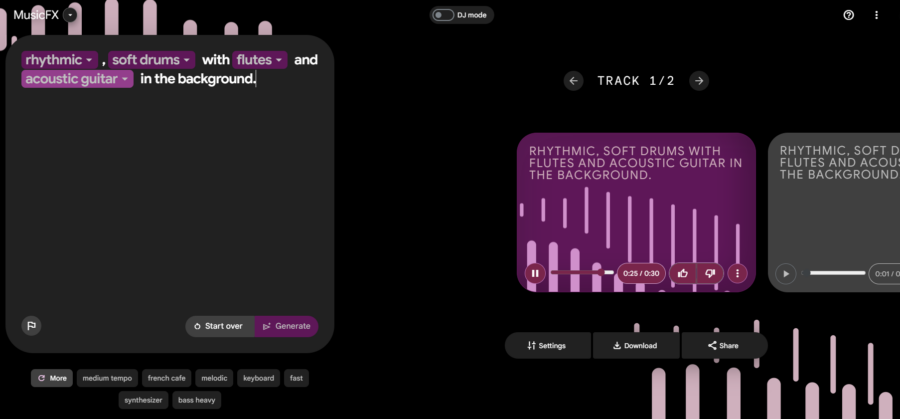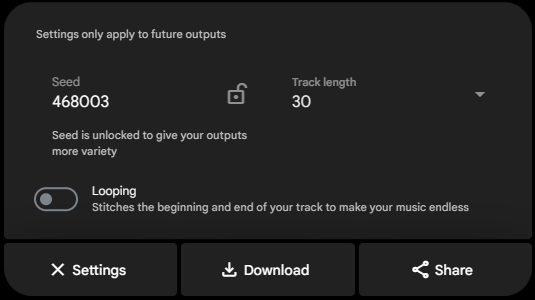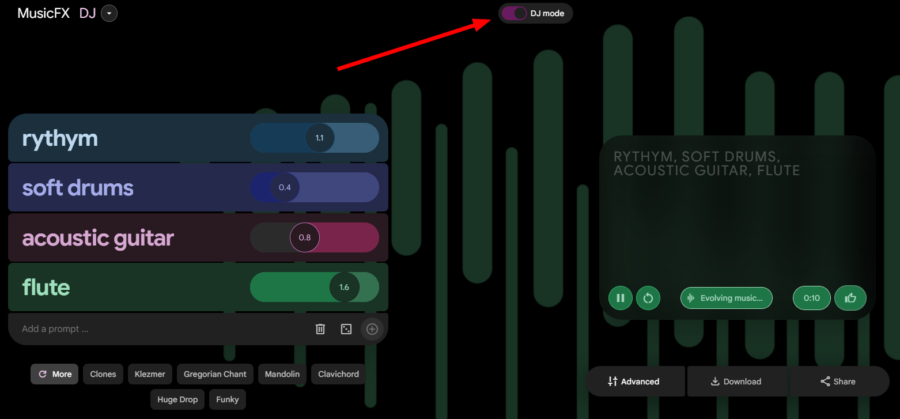MusicLM is Google’s generative AI model to produce music from text descriptions. In addition to a text prompt, it can also take melodies or existing tracks to build upon. The experience of using MusicLM is similar to other such generative AI technologies for text-to-text (ex. ChatGPT) and text-to-image (ex. Midjourney) creations.
However, MusicLM isn’t available for public testing. It was a part of AI Test Kitchen (in Google Labs) initially, but now, all we have is MusicFX in place to test out AI music capabilities.
What is MusicFX?
MusicFX is a toned-down version of MusicLM one can try within Google Labs. It has an improved interface, which lets one change the track length and get looped responses.
Besides, its DJ mode allows changing music by adding prompts in real-time.
Compared to MusicLM samples, I could see there is no way to produce vocals with MusicFX, which is likely a copyright battle Google tried to avoid. In addition, MusicFX cannot accept existing tracks as prompts, and one must start with text descriptions.
With those limitations, MusicFX is still exciting to try. The following sections explain how to access it and a few example prompts, along with the responses I got.
How to Access MusicFX?
MusicFX is a part of AI Test Kitchen, and one can access it by simply visiting the MusicFX page.
While this tool is live in 100+ countries, use a VPN if you get a popup indicating “This tool isn’t available in your country yet.”

MusicFX has a clean interface, with the left panel hosting the prompt space. It highlights the keywords, which you can alter to change the response.
The right-hand area produces two melodies per prompt.
MusicFX settings let a user lock the seed (for consistent generations), choose the track length (30-70 seconds), and loop the responses.

Besides, one can download the results and share them with others.
However, the highlight of MusicFX is its DJ mode. A user can add up to 10 parameters (emotions, instruments, etc.), adjust their weight, and see the music “evolve” accordingly.

Hands-on testing of MusicFX
I have tried MusicFX to see how easy it is to produce music and if it feels good at all. Here are a few examples, with prompts similar to MusicLM examples.
Prompt 1: rhythmic, soft drums with flutes and acoustic guitar in the background.This is one of the best responses I could generate, which followed the prompt quite precisely.
Prompt 2: time to relax (0:00-0:15)
time to shine (0:15-0:30)
time to sprint (0:30-0:45)This output shows the limitations of such tools. I felt it could have adjusted the beats as per the prompt, but instead, it produced generalized, vague music having little resemblance to the input. Moreover, it could not keep the track length to 45 seconds, as asked.
Prompt 3: A slow meditative song, with harmonica and piano, creating a sense of peace and tranquillity.Again, MusicFX gives out a generic response, with little to no harmonica as instructed and an unwarranted inclusion of a lot of background flute.
Pros and Cons of MusicFX
Let me sum-up this brief hands-on with the following pros and cons.
Pros
Interesting way to create generic music from text
Good for getting initial ideas to later build upon
Cons
Lack of vocals limits the production variety
Responses mostly suffer from AI hallucinations
Limited global presence
MusicFX Verdict
I have been using generative AI tools since ChatGPT made headlines back in the last quarter of 2022. Though creating text is entirely different and easier than generating music, all such AI tools follow a similar pattern.
Owning to the lack of creativity of their own, the responses tend to become monotonous and boring. It was less visible with text and images, but it is increasingly apparent with music, unfortunately.
Besides, one cannot generate music beyond 70 seconds of track length. And the absence of vocals adds to MusicFX’s drawbacks.
Overall, it’s good to experiment with MusicFX, but I can’t see any serious, real-life implementation in music production yet. What this AI model can indeed provide is a foundation on which artists have to build extensively to wow the listeners. And that won’t be possible without their invaluable, creative expertise.
More on AI Audio Tools
-
 EditorUsha, the editor-in-chief of Geekflare, is a tech-savvy and experienced marketer with a Master’s degree in Computer Applications. She has over a decade of experience in the tech industry, starting as a software engineer and then moving into digital marketing and team management.
EditorUsha, the editor-in-chief of Geekflare, is a tech-savvy and experienced marketer with a Master’s degree in Computer Applications. She has over a decade of experience in the tech industry, starting as a software engineer and then moving into digital marketing and team management.


